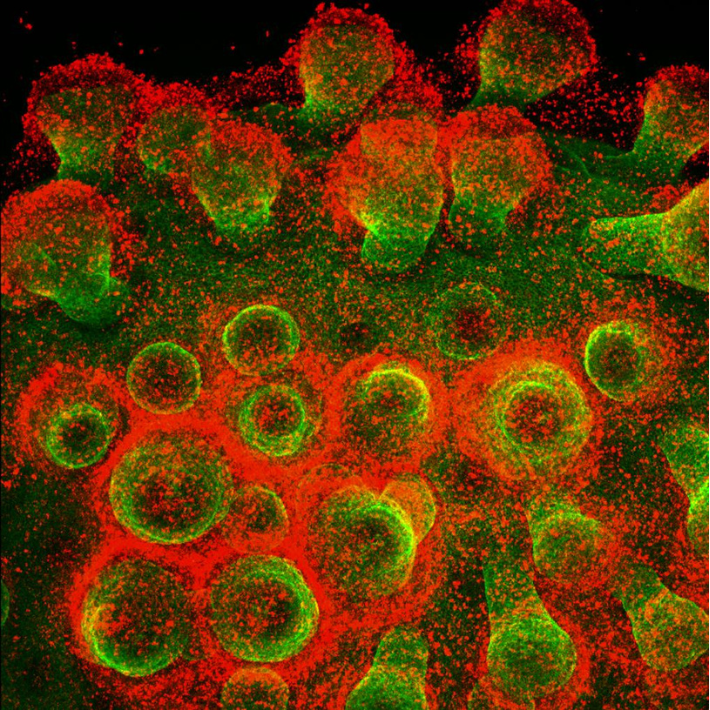Lab-produced human skin suitable for research on monkeypox virus
In green, a zoomed-in section of a skin organoid with mpoxvirus in red.
&width=710&height=710)
An organoid is an artificially cultured miniature version of an organ. In an article published in the scientific journal Nature Microbiology scientists from Leiden and Rotterdam describe how they generate skin organoids from stem cells, and use them for modeling mpox virus infection. Like real human skin, a skin organoid consists of multiple layers and different cell types, and sometimes even hair.
The researchers conclude that skin organoids are very suitable for studying mpox. In a close collaboration, researchers dr. Spiros Pachis (from the lab of Karine Raymond, LUMC) and dr. Pengfei Li (from the lab of Qiuwei Abdullah Pan, ErasmusMC) infected the organoids with the mpox virus and followed them over time. Pachis: "What we saw was that the organoids were able to support the full life cycle of the virus. Mpox could infect cells and use them to produce new virus particles that were in turn able to infect other cells." The researchers also observed that treating the infected skin organoids with the antiviral drug tecovirimat inhibits the production of virus particles. Tecovirimat is authorised in the EU for the treatment of mpox.
What is mpox?
Mpox, formerly known as monkeypox, is a disease that primarily occurs in West Africa and Central Africa. In 2022, the disease was diagnosed in people in Europe and America, areas where the disease is not originally found. The virus mainly infects the skin, causing blisters, bumps, or spots.
Until now, research on mpox has mainly been conducted using cell lines and animal models. "Skin organoids are the best tool we currently have at our disposal to mimic what actually happens in human skin", says Pachis. The researchers expect that organoids will be used to learn more about how the body responds to infection with the mpox virus and serve as a model for testing new drugs.
Stem cells and organoids have enormous potential
The study provides a foundation for future research into viral infections of the skin. "Our work is a great example of the immense potential that stem cells, and the organoids that can be created from them, hold. We believe that using skin organoids to study viral infections can brings us valuable insights for the development of better treatments for patients", says Raymond, co-leader of the study.
This study is a collaboration of researchers from Leiden University Medical Center, Erasmus MC and the Novo Nordisk Foundation Center for Stem Cell Medicine (reNEW). The study leaders are Karine Raymond (LUMC, reNEW) and Qiuwei Abdullah Pan (Erasmus MC).